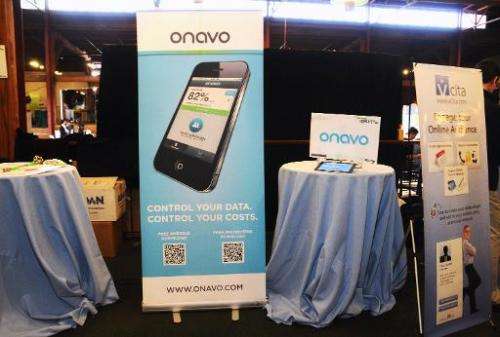Facebook recently paid an estimated $150 million for Israeli startup Onavo, which develops applications to help users better manage mobile data costs
Israeli hi-tech has become the target of a buying frenzy, with startups sparking investment bids and a flurry of mergers and acquisitions unseen since the dotcom bubble burst in 2000.
New ventures raised $660 million (486 million euros) in the third quarter of 2013, up from $488 million over the same period a year earlier, according to IVC Research Centre, the main Israeli database on the subject.
And interest in small, innovative Israeli companies shown by US hi-tech heavyweights and other international players appears to be growing.
While nine Israeli startups were snapped up for more than $400 million between 2003 and 2011, six businesses were sold for well over that amount this year alone.
The latest acquisition was that of PrimeSense, a 3D motion-sensing firm which was purchased by Nasdaq-heavyweight Apple for an undisclosed amount estimated at around $360 million (265 million euros).
Six weeks beforehand, Facebook paid an estimated $150 million (110 million euros) for another Israeli startup called Onavo.
And in September, IBM completed the acquisition of security software provider Trusteer for a billion dollars, on the heels of Google's purchase crowd-sourced map app Waze for a reported $1.3 billion.
A growing number of hi-tech companies of Israeli origin are being listed on foreign equity markets, including the London Stock Exchange and Nasdaq in New York.
Israeli hi-tech entrepreneur Yossi Vardi speaks during the TechCrunch seminar in New York City, on April 29, 2013
"The sector as a whole is growing briskly, particularly in the United States where the Nasdaq is well up, and significant funds are invested in hi-tech," said Yossi Vardi, a prominent Israeli hi-tech entrepreneur.
"The big players in the market are in fierce competition with one another," he added.
"They are looking for innovative new companies and come to Israel to find and buy them."
The majority of buyers are from across the Atlantic, IVC director Koby Simana said.
"Most of the funds invested today in Israeli hi-tech companies come from foreign investors, mostly US venture capital funds," he said.
The close cooperation between Israeli hi-tech companies and universities such as the Technion technological institute in Haifa account for a large number of success stories.
Israel's Silicon Valley
The area around the northern port city has become known as a second Silicon Valley due to its concentration of start-ups, R and D centres and young graduates, Simana says.
Companies such as Intel, IBM, Microsoft and Yahoo have set up offices around the Technion and recruit students directly out of school or even as they pursue their studies.
View of the northern Israeli port city of Haifa, which has become known as a second Silicon Valley because of a high concentration of hi-tech companies
"These young people are ambitious, they are not afraid to take risks, they want to constantly innovate," said Vardi, a member of the Technion board.
Some analysts believe that massive acquisitions of Israeli startups by large foreign corporations stifle the spread of the hi-tech sector's energy to the broader Israeli economy, but Simana sees the downside as limited.
"It is true that there have been some spectacular exits but in most cases entrepeneurs who managed to get a startup on its feet (and sell it) have then restarted the cycle, creating positive fallout for the Israeli economy," he said.
"I do not know of any other economic sectors in Israel that attract investors from the American, European and Asian markets," he added.
© 2013 AFP
























